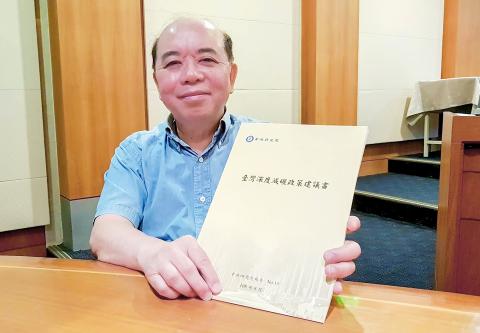Academia Sinica yesterday released a white paper urging authorities to adopt more drastic plans to curb greenhouse gas emissions and draft climate change legislation.
The drafting of the white paper, “Taiwan Deep Decarbonization Policy,” started in 2015 and took more than three years to finish, as it involves many fields, including energy-related techniques, economic development and social communication, said Wang Pao-kuan (王寶貫), director of Academia Sinica’s Research Center for Environmental Changes and lead author of the report.
Taiwan’s greenhouse gas emissions in 2015 reached 284.643 million tonnes of carbon dioxide equivalent, up from 137.854 million tonnes in 1990, the paper says.

Photo: Chien Hui-ju, Taipei Times
In 2015, carbon dioxide made up about 95.21 percent of the nation’s total greenhouse gas emissions, followed by methane (1.91 percent), nitrous oxide (1.58 percent) and hydrofluorocarbons (1.3 percent), it says.
In the Germanwatch Climate Change Performance Index 2019, Taiwan placed 56th, dropping two places from last year’s report and ranking among the world’s worst performers.
With its reliance on export trade, Taiwan might face “border carbon adjustments” imposed by foreign countries if it does not take more drastic action to curb emissions, Academia Sinica said.
It said that 89.82 percent of the nation’s greenhouse gas emissions in 2015 were discharged by the energy sector, 7.79 percent by the industrial sector, 0.95 percent by the agricultural sector and 1.44 percent by the waste sector.
The government must carefully assess the pros and cons of various power sources, including nuclear energy, when planning energy reforms while paying attention to potential socioeconomic problems, it says.
It should work harder to promote energy preservation, boost energy efficiency and consider hiking electricity prices or levying a carbon tax, the paper says.
The nation needs a climate change act to integrate climate action across sectors, but before such an act is legislated, it should implement the Greenhouse Gas Reduction and Management Act (溫室氣體減量及管理法) promulgated in 2015, even though its goals are not ambitious enough, it says.
If global warming has become an accepted fact, then people need to know more about its driving mechanism, the speed of warming related to rising ocean temperatures and partial pressure of carbon dioxide in oceans, National Taiwan University’s Institute of Oceanography director Jan Sen (詹森) said separately.
Regional scientists should carry out long-term observations in the South China Sea, the East China Sea, the Kuroshio east of Taiwan and the western North Pacific to establish a seawater temperature database, Jan said, expressing the hope that the Ministry of Science and Technology or the Ocean Affairs Council would support such projects.
The Environmental Protection Administration is to hold public hearings to collect opinions on how to achieve by 2025 its goal of cutting greenhouse gas emissions by 10 percent from 2005 levels, Department of Environmental Management Deputy Director Huang Wei-ming (黃偉鳴) said, adding that it looks forward to having more collaboration with academics.

The Ministry of Economic Affairs has fined Taobao NT$1.2 million (US$36,912) for advertisements that exceed its approved business scope, requiring the Chinese e-commerce platform to make corrections in the first half of this year or its license may be revoked. Lawmakers have called for stricter enforcement of Chinese e-commerce platforms and measures to prevent China from laundering its goods through Taiwan in response to US President Donald Trump’s heavy tariffs on China. The Legislative Yuan’s Finance Committee met today to discuss policies to prevent China from dumping goods in Taiwan, inviting government agencies to report. Democratic Progressive Party Legislator Kuo Kuo-wen (郭國文) said

The Ministry of Economic Affairs has fined Taobao NT$1.2 million (US$36,900) for advertisements that exceeded its approved business scope and ordered the Chinese e-commerce platform to make corrections in the first half of this year or its license would be revoked. Lawmakers have called for stricter supervision of Chinese e-commerce platforms and more stringent measures to prevent China from laundering its goods through Taiwan as US President Donald Trump’s administration cracks down on origin laundering. The legislature’s Finance Committee yesterday met to discuss policies to prevent China from dumping goods in Taiwan, inviting government agencies to report on the matter. Democratic Progressive Party

Taiwan and its Pacific ally Tuvalu on Tuesday signed two accords aimed at facilitating bilateral cooperation on labor affairs, according to Taiwan’s Ministry of Foreign Affairs (MOFA). The governments inked two agreements in Taipei, witnessed by Foreign Minister Lin Chia-lung (林佳龍) and visiting Deputy Tuvaluan Prime Minister Panapasi Nelesone, MOFA said in a news release. According to MOFA, the agreements will facilitate cooperation on labor issues and allow the two sides to mutually recognize seafarers’ certificates and related training. Taiwan would also continue to collaborate with Tuvalu across various fields to promote economic prosperity as well as the well-being of their

Sung Chien-liang (宋建樑), who led efforts to recall Democratic Progressive Party (DPP) Legislator Lee Kun-cheng (李坤城), was released on bail of NT$80,000 today amid outcry over his decision to wear a Nazi armband to questioning the night before. Sung arrived at the New Taipei District Prosecutors’ Office for questioning in a recall petition forgery case last night wearing a red armband bearing a swastika, carrying a copy of Adolf Hitler’s Mein Kampf and giving a Nazi salute. Sung left the building at 1:15am without the armband and covering the book with his coat. Lee said today that this is a serious